
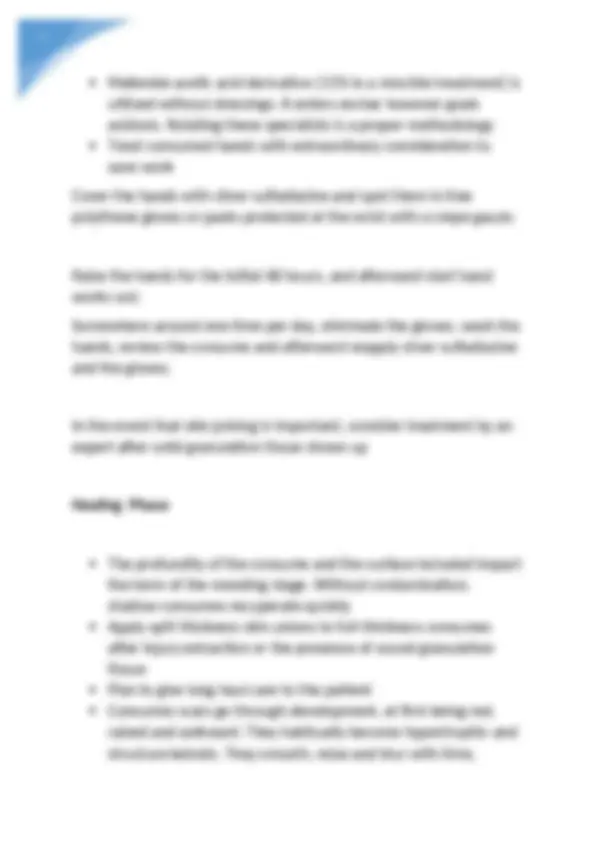
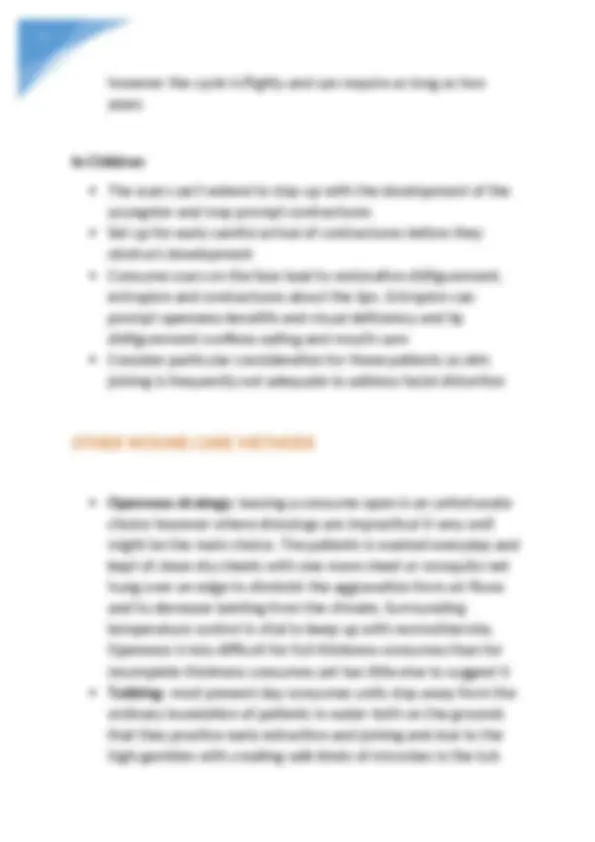
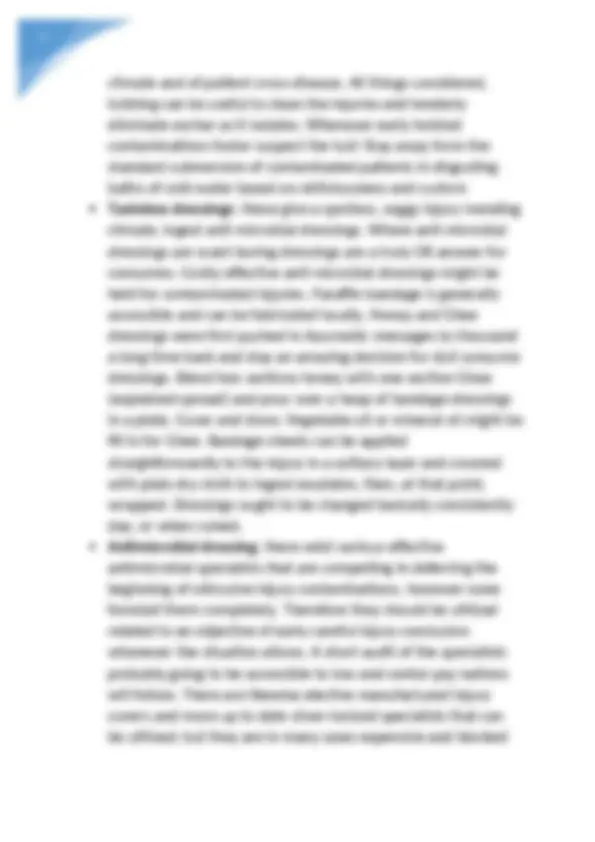
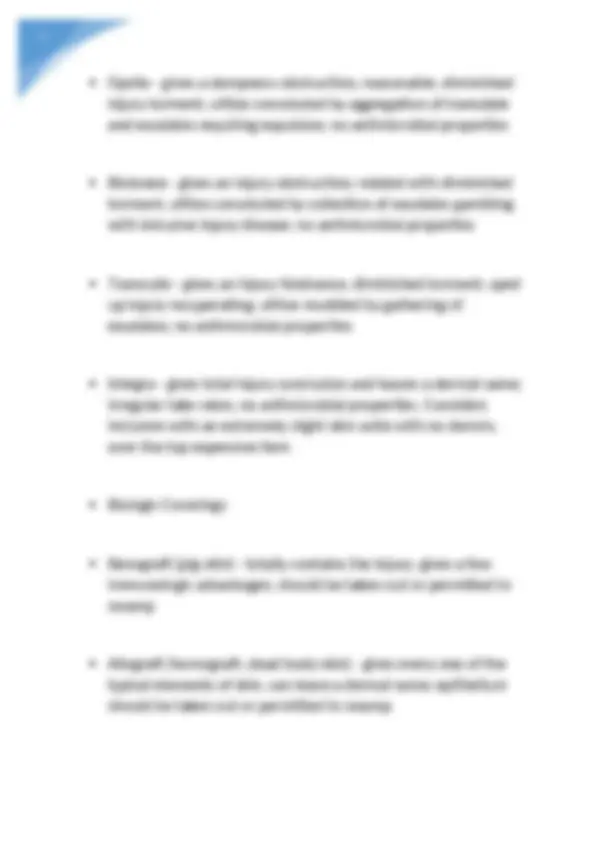
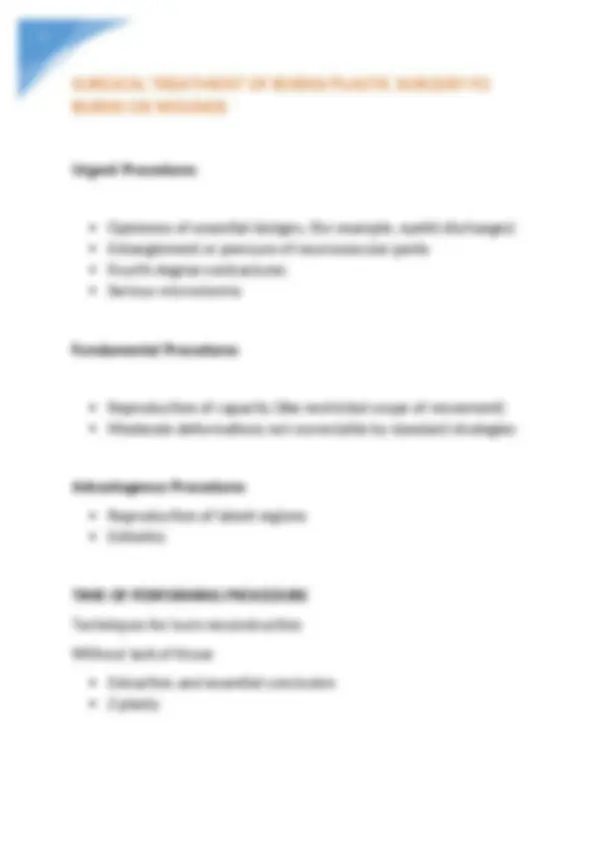
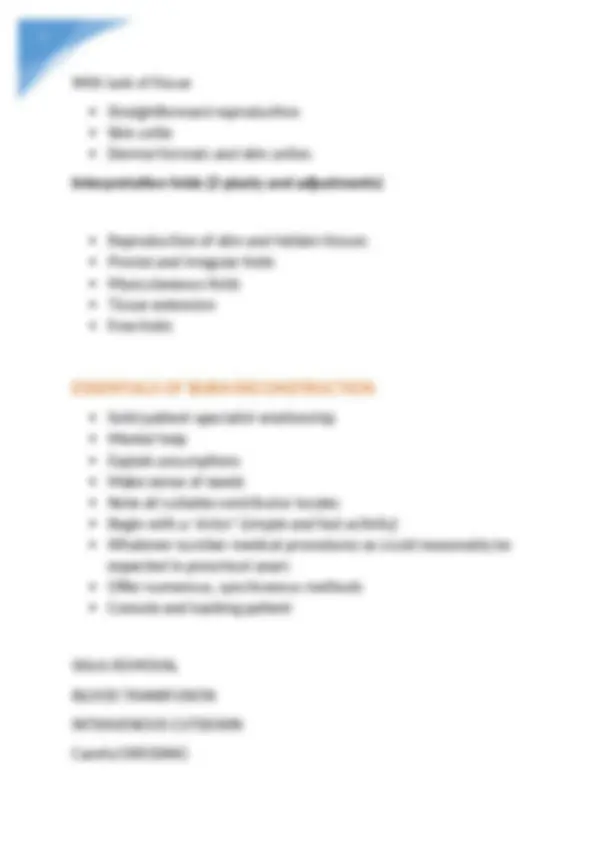


Study with the several resources on Docsity

Earn points by helping other students or get them with a premium plan


Prepare for your exams
Study with the several resources on Docsity

Earn points to download
Earn points by helping other students or get them with a premium plan
Community
Ask the community for help and clear up your study doubts
Discover the best universities in your country according to Docsity users
Free resources
Download our free guides on studying techniques, anxiety management strategies, and thesis advice from Docsity tutors
It is about wound care . procedure
Typology: Lecture notes
This document is temporarily unavailable for download
Available from 08/04/2023
7 documents
1 / 11

This page cannot be seen from the preview
Don't miss anything!







This document is temporarily unavailable for download
WOUND CARE – First Aid, Initial Treatment, Daily Treatment, Healing Phase and Wound Care Methods FIRST AID Assuming the patient shows up at the wellbeing office without medical aid having been given, soak the consume completely with cool water to forestall further harm and take off all consumed clothing. On the off chance that the consume region is restricted, inundate the site in chilly water for 30 minutes to lessen torment and edema and to limit tissue harm In the event that the region of the consume is huge, after it has been do utilized with cool water, apply clean wraps about the consumed region (or the entire patient) to forestall foundational heat misfortune and hypothermia Hypothermia is a specific gamble Initial 6 hours following injury are basic; transport the patient with serious consumes to a clinic straightaway Initial Treatment At first, consumes are sterile. Center the treatment around expedient recuperating and avoidance of contamination In all cases, direct lockjaw prophylaxis Besides in tiny consumes, debride all bullae. Extract disciple necrotic (dead) tissue at first and debride all necrotic tissue over the initial a few days
After debridgement, tenderly scrub the ignite with 0.25% (2. g/liter) chlorhexidine arrangement, 0.1% (1 g/liter) cetrimide arrangement, or another gentle water-based clean. Try not to utilize liquor based arrangements Delicate cleaning with eliminate the free necrotic tissue. Apply a meager layer of anti-infection cream (silver sulfadiazine) Dress the ignite with oil bandage and dry cloth adequately thick to forestall leakage to the external layers Daily Treatment Change the dressing day to day (two times everyday if conceivable) or as frequently as important to forestall leakage through the dressing. On each dressing change, eliminate any free tissue. Review the injuries for staining or discharge, which demonstrate creating disease Fever is anything but a helpful sign as it might continue until the consume wound is shut Cellulitis in the encompassing tissue is a superior sign of disease Give fundamental anti-toxins in instances of hemolytic streptococcal injury contamination or septicemia Pseudomonas aeruginosa contamination frequently brings about septicemia and demise. Treat with foundational aminoglycosides Oversee effective anti-infection chemotherapy day to day. Silver nitrate (0.5% fluid) is the least expensive, is applied with occlusive dressings however doesn't enter eschar. It exhausts electrolytes and stains the neighborhood climate Utilize silver sulfadiazine (1% miscible treatment) with a solitary layer dressing. It has restricted eschar infiltration and may cause neutropenia
however the cycle is flighty and can require as long as two years In Children The scars can't extend to stay up with the development of the youngster and may prompt contractures Set up for early careful arrival of contractures before they obstruct development Consume scars on the face lead to restorative disfigurement, ectropion and contractures about the lips. Ectropion can prompt openness keratitis and visual deficiency and lip disfigurement confines eating and mouth care Consider particular consideration for these patients as skin joining is frequently not adequate to address facial distortion
Openness strategy : leaving a consume open is an unfortunate choice however where dressings are impractical it very well might be the main choice. The patients is washed everyday and kept of clean dry sheets with one more sheet or mosquito net hung over an edge to diminish the aggravation from air flows and to decrease tainting from the climate. Surrounding temperature control is vital to keep up with normothermia. Openness is less difficult for full-thickness consumes than for incomplete thickness consumes yet has little else to suggest it Tubbing : most present day consumes units stay away from the ordinary inundation of patients in water both on the grounds that they practice early extraction and joining and due to the high-gambles with creating safe kinds of microbes in the tub
climate and of patient cross-disease. All things considered, tubbing can be useful to clean the injuries and tenderly eliminate eschar as it isolates. Whenever early twisted contaminations foster suspect the tub! Stay away from the standard submersion of contaminated patients in disgusting baths of cold water based on obliviousness and custom Tasteless dressings : these give a spotless, soggy injury mending climate, ingest anti-microbial dressings. Where anti-microbial dressings are scant boring dressings are a truly OK answer for consumes. Costly effective anti-microbial dressings might be held for contaminated injuries. Paraffin bandage is generally accessible and can be fabricated locally. Honey and Ghee dressings were first pushed in Ayurvedic messages to thousand a long time back and stay an amazing decision for dull consume dressings. Blend two sections honey with one section Ghee (explained spread) and pour over a heap of bandage dressings in a plate. Cover and store. Vegetable oil or mineral oil might be fill in for Ghee. Bandage sheets can be applied straightforwardly to the injury in a solitary layer and covered with plain dry cloth to ingest exudates, then, at that point, wrapped. Dressings ought to be changed basically consistently day, or when ruined. Antimicrobial dressing : there exist various effective antimicrobial specialists that are compelling in deferring the beginning of obtrusive injury contaminations, however none forestall them completely. Therefore they should be utilized related to an objective of early careful injury conclusion whenever the situation allows. A short audit of the specialists probably going to be accessible to low and center pay nations will follow. There are likewise elective manufactured injury covers and more up to date silver-ionized specialists that can be utilized; but they are in many cases expensive and blocked
Mupirocin (bactroban) - more viable staphylococcal inclusion; doesn't repress epithelialization; costly Antimicrobial Soaks 0.5% silver nitrate - viable against all microorganisms; stains reached regions; filters sodium from wounds; may cause methemoglobinemia 5% mafenide acetic acid derivation - wide antibacterial inclusion; no parasitic inclusion; agonizing on application to sensate injury; wide application related with metabolic acidosis, and consequently for the most part utilized for little high-risk regions like ligament inclusion in nose and ears 0.025% sodium hypochlorite (Dakin arrangement) - compelling against all microorganisms, especially gram-positive life forms, gently hinders epithelialization 0.25% acidic corrosive - compelling against most life forms, especially gram-negative ones; gently restrains epithelialization Manufactured Coverings
Opsite - gives a dampness obstruction; reasonable; diminished injury torment; utilize convoluted by aggregation of transdate and exudates requiring expulsion; no antimicrobial properties Biobrane - gives an injury obstruction; related with diminished torment; utilize convoluted by collection of exudates gambling with intrusive injury disease; no antimicrobial properties Transcyte - gives an injury hindrance; diminished torment; sped up injury recuperating; utilize muddled by gathering of exudates; no antimicrobial properties Integra - gives total injury conclusion and leaves a dermal same; irregular take rates; no antimicrobial properties. Considers inclusion with an extremely slight skin unite with no dermis; over the top expensive item Biologic Coverings Xenograft (pig skin) - totally contains the injury; gives a few immunologic advantages; should be taken out or permitted to swamp Allograft (homograft, dead body skin) - gives every one of the typical elements of skin; can leave a dermal same; epithelium should be taken out or permitted to swamp
With lack of tissue Straightforward reproduction Skin unite Dermal formats and skin unites Interpretation folds (Z-plasty and adjustments) Reproduction of skin and hidden tissues Pivotal and irregular folds Myocutaneous folds Tissue extension Free folds
Solid patient-specialist relationship Mental help Explain assumptions Make sense of needs Note all suitable contributor locales Begin with a 'victor' (simple and fast activity) Whatever number medical procedures as could reasonably be expected in preschool years Offer numerous, synchronous methods Console and backing patient Stitch REMOVAL BLOOD TRANSFUSION INTRAVENOUS CUTDOWN Careful DRESSING
Careful FOMENTATION